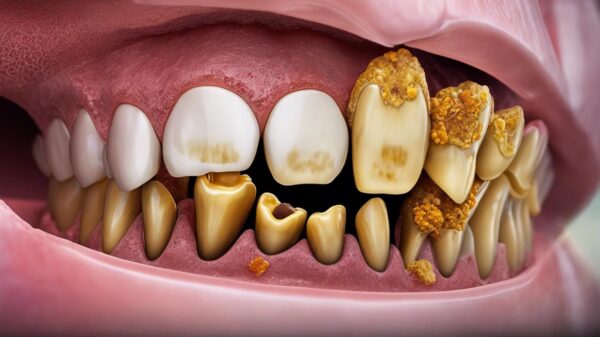The Impact of Stress on Oral Health
In today’s fast-paced world, stress has become a common companion for many individuals. While its effects on mental and physical health are well-known, its impact on oral health is often overlooked. Stress can manifest in numerous ways, and its effects on oral health are more interconnected than one might imagine.
This comprehensive article delves into the various aspects of how stress affects oral health, providing valuable insights and expert advice to help you maintain a radiant smile even in stressful times.
What Are the Effects of Stress On Oral Health?
Stress can wreak havoc on your oral health, causing a range of issues that demand attention and care. From teeth grinding to compromised immune responses, stress doesn’t discriminate when it comes to its impact on your mouth. Understanding these effects is crucial for taking proactive steps to mitigate them.

The Dental Dilemma: Effects of Stress on Oral Hygiene
Stress can lead to neglecting proper oral hygiene routines, such as brushing and flossing. This negligence creates an environment ripe for bacteria growth and plaque buildup.
As stress weakens the immune system, the body’s ability to combat oral infections diminishes, leading to an increased risk of gum disease, cavities, and bad breath.
Grinding Gears: Bruxism and Stress
Stress often finds an outlet in unconscious teeth grinding, known as bruxism. This habit exerts excessive pressure on teeth, potentially causing enamel erosion, tooth sensitivity, and jaw pain. It can also lead to temporomandibular joint (TMJ) disorders, resulting in chronic facial pain, headaches, and overall discomfort.
Cracking Under Pressure: Effects on TMJ
Temporomandibular joint disorders (TMJ) are commonly linked to stress. Stress-induced muscle tension can cause the jaw joint to become inflamed, resulting in pain, clicking sounds, and restricted jaw movement. Managing stress is vital to prevent these uncomfortable and sometimes debilitating effects.
Stress-Induced Canker Sores: Mouth Ulcers
Canker sores, those painful ulcers that appear in the mouth, can be triggered or exacerbated by stress. While their exact cause isn’t fully understood, stress weakens the immune system, making the mouth more susceptible to these irritating sores.
Weakened Immune Responses and Oral Health
Stress disrupts the body’s immune responses, affecting its ability to fend off infections, including oral infections. This can lead to prolonged healing times for gum infections, oral sores, and other issues, making stress management an essential aspect of maintaining good oral health and ensuring a swift recovery.
From Stress to Smoking: Impact on Habits
Stressful situations can drive individuals to harmful habits like smoking or excessive alcohol consumption, both of which have detrimental effects on oral health. Smoking, in particular, increases the risk of gum disease and oral cancers, compounding the damage caused by stress.
Bite of Anxiety: Nail Biting and its Consequences
Nail biting is a common habit during stressful periods. This seemingly innocuous habit, however, can lead to chipped teeth, worn enamel, and even jaw alignment issues over time. Finding healthier ways to cope with stress can spare your smile from unnecessary damage and promote your overall oral well-being.

Gritting Teeth: Effects of Stress-Induced Teeth Grinding
Teeth grinding, or bruxism is a well-known consequence of stress. The constant grinding can wear down teeth, leading to fractures, enamel loss, and even tooth loss in severe cases. Using a mouthguard and practicing stress-reduction techniques can help safeguard your teeth.
The Gut-Oral Health Connection: Stress and Digestion
The gut and oral health are closely intertwined. Stress can disrupt the balance of gut bacteria, which, in turn, can affect oral health. Digestive issues can lead to acid reflux, eroding tooth enamel, and increasing the risk of cavities, highlighting the intricate connection between your gut and your oral well-being.
Tips for Caring For Your Oral Health During Stress
Here are some practical tips for caring for your oral health during stressful seasons:
1. Maintain a Solid Oral Hygiene Routine
Stress can tempt us to slack on oral care, but consistent brushing and flossing are non-negotiable. Brush twice daily with fluoride toothpaste and floss to prevent plaque buildup and cavities, ensuring a strong foundation for your oral health.
2. Combat Teeth Grinding with Awareness
Stress often leads to teeth grinding or bruxism. Train yourself to be aware of clenching during the day, and at night, consider using a nightguard to protect your teeth, ensuring a restful sleep and minimizing dental damage.
3. Show Your Gums Some Love
Stress weakens the immune system, making gums susceptible to infection. Gargle with an antimicrobial mouthwash and schedule regular dental check-ups to catch any gum issues early, promoting long-term oral health and peace of mind.
4. Soothe Canker Sores Naturally
Stress can trigger painful canker sores. Rinse your mouth with saltwater to alleviate discomfort and avoid irritants like spicy or acidic foods, facilitating a quicker healing process and minimizing further irritation.
5. Feed Your Body Well
A balanced diet rich in vitamins and minerals supports your immune system, helping it combat the effects of stress on oral health. Opt for nutrient-dense foods and limit sugary snacks to provide your body with the necessary tools to thrive.
6. Practice Stress-Relief Techniques
Engage in stress-reduction activities such as deep breathing, meditation, or yoga. These practices not only benefit your mind but also your oral health by promoting relaxation and reducing the potential for stress-related dental issues.
7. Stay Hydrated to Avoid Dry Mouth
Stress can reduce saliva production, leading to dry mouth. Keep hydrated by drinking water throughout the day and consider using saliva substitutes if needed, ensuring your mouth stays moist and your oral health remains optimal.
8. Ditch Harmful Coping Mechanisms
Smoking and excessive alcohol consumption are detrimental to oral health. Opt for healthier ways to cope with stress, such as exercise or spending time with loved ones, promoting both your overall well-being and your vibrant smile.
9. Regular Dental Visits are a Must
Regular dental check-ups are vital, especially when stress is high. Dentists can identify issues early and provide guidance on maintaining oral health, ensuring your smile remains resilient even during challenging times.
10. Be Gentle with Yourself
Prioritize self-care by getting enough rest, staying active, and practicing relaxation techniques. A holistic approach to well-being positively impacts your oral health, fostering a harmonious balance between your mind, body, and smile.

Conclusion
Stress is a formidable opponent that can affect various aspects of our well-being, including oral health. From compromising oral hygiene to triggering bruxism and exacerbating existing conditions, stress demands our attention.
By recognizing these effects and taking proactive steps to manage stress, you can safeguard your smile and overall well-being. Remember, a healthy mind and body often translate to a healthy mouth.
FAQs
Can stress really cause cavities?
Yes, chronic stress weakens the immune system, making your mouth more susceptible to bacterial growth and increasing the risk of cavities, emphasizing the importance of proactive oral care during stressful periods.
How can I stop grinding my teeth when stressed?
Managing stress through relaxation techniques, exercise, and, if necessary, wearing a mouthguard at night can help alleviate teeth grinding, safeguarding your teeth from the damaging effects of bruxism.
Is there a connection between stress and gum disease?
Absolutely. Stress compromises the immune system, reducing its ability to fight off gum infections and increasing the likelihood of gum disease, underlining the need for stress management to maintain optimal gum health.
Can stress lead to dry mouth?
Yes, stress can lead to a dry mouth by disrupting saliva production. Saliva helps neutralize acids and maintain oral health, making its absence during stressful periods a concern for your overall oral well-being.
What role does diet play in stress-related oral health issues?
A balanced diet rich in nutrients is crucial for maintaining good oral health, especially during stressful periods when the immune system might be compromised, reinforcing the role of proper nutrition in fortifying your smile.
How can I protect my oral health during stressful times?
Practicing stress-reduction techniques, maintaining a consistent oral hygiene routine, and seeking professional dental care can all contribute to protecting your oral health.












